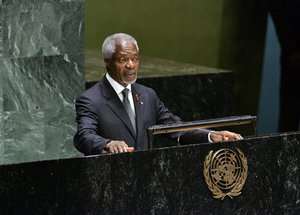
UNITED NATIONS, New York On the final day of a crucial United Nations special session on HIV/AIDS, Secretary General Kofi Annan delivered a gloomy assessment Friday of global efforts to fight the epidemic, saying the world was losing the battle.
"The epidemic continues to outpace us," he told a jammed session of the General Assembly. "There are more new infections than ever before, more deaths than ever before, more women and girls infected than ever before."
Annan, who is from Ghana and has made fighting AIDS a priority of his tenure, acknowledged some areas of progress since he convened the last UN Special Session on AIDS, in 2001: Some African nations have declining rates of the disease and seven times more people have access to treatment.
But he said that if countries "don't step up the fight drastically" the world would not be able to "reverse the tide." He called HIV/AIDS, "the single greatest reversal in the history of human development."
The delegates were circulating a draft action plan, which was expected to be adopted by the close of the conference Friday.
The dark tone of Annan's remarks diverged markedly from those in the upbeat speeches at the start of the three- day session on Wednesday, and also from the positive comments that immediately preceded his remarks, by the American first lady, Laura Bush.
"This is a hopeful moment in the fight against AIDS," Bush began as she opened the General Assembly session Friday. She noted that her husband, President George W. Bush, in 2003 had earmarked $15 billion over five years to fight AIDS around the world. "The American people are on track to meet or exceed that commitment."
But Annan, the next speaker, said, "This fight requires every president, every parliamentarian to say, 'AIDS stops with me.'"
The United States has been roundly criticized by AIDS activists for sending Laura Bush as its representative, rather than a senior administration official. France and Brazil sent their foreign ministers, for example, and many African presidents were in attendance.
Bush's five-minute speech steered away from many of the criticisms that have been leveled against the United States' international AIDS policy, most notably that it promotes sexual abstinence over scientifically proven strategies, particularly the use of condoms.
"The U.S. funds abstinence or abstinence-until-marriage programs that are ideologically driven and have nothing to do with reality," said Jodi Jacobson, president of the Center for Health and Gender Equality in the United States. "In a lot of places, teenagers are sexually active and married women are getting infected from their husbands."
Jacobson noted that at this week's session, U.S. delegates had pushed to have phrases like "sex workers" or "men who have sex with men," taken out of conference documents, preferring "vulnerable groups" instead.
It has sided with Syria and Yemen in refusing to talk about "the empowerment of girls," she said.
Bush did not address such controversies. She did, however, make at least passing acknowledgment to the official UN program for AIDS prevention, known as ABC, an acronym taken from its three central principles: Abstinence, Be faithful and Condom use. She noted that "Africa's ABC model has led to dramatic declines in HIV" in some countries.
She also suggested the creation of an international HIV testing day, and highlighted how the wider availability of anti-AIDS drugs had allowed people with HIV "a second chance at life."
But the trio of UN officials who spoke after her emphasized that far too few people in Africa had access to such drugs and that the United Nations was desperately short of the money needed to improve the situation.
The Global Fund to Fight AIDS, Tuberculosis and Malaria - a war chest of money created after the 2001 conference - has helped more than 500,000 people receive the lifesaving cocktail of anti-HIV drugs, a number that has increased by 40 percent in the past six months.
But the World Health Organization estimates that only one in six people with HIV is able to get such treatment because the drugs are expensive.
The United Nations estimates that it needs $18 billion to combat AIDS in 2007 and $22 billion in 2008. The United Nations has less than half that amount committed, said Richard Feachem, head of the Global Fund. "Public and private funding," he said, "needs to be greatly expanded. Let all countries contribute fully according to their means."




 Akufo-Addo’s govt is the ‘biggest political scam’ in Ghana’s history – Mahama ja...
Akufo-Addo’s govt is the ‘biggest political scam’ in Ghana’s history – Mahama ja...
 Performance Tracker is not evidence-based — Mahama
Performance Tracker is not evidence-based — Mahama
 Four arrested for allegedly stealing EC laptops caged
Four arrested for allegedly stealing EC laptops caged
 $360 million IMF bailout not enough for Ghana – UGBS Professor
$360 million IMF bailout not enough for Ghana – UGBS Professor
 Shrinking Penis Allegations: Victim referred to trauma hospital due to severity ...
Shrinking Penis Allegations: Victim referred to trauma hospital due to severity ...
 Adu Boahen Murder: Case adjourned to May 9
Adu Boahen Murder: Case adjourned to May 9
 ‘I've health issues so I want to leave quietly and endure my pain’ — Joe Wise ex...
‘I've health issues so I want to leave quietly and endure my pain’ — Joe Wise ex...
 Let’s help seek second independence for Ghana before NPP sells the country – Law...
Let’s help seek second independence for Ghana before NPP sells the country – Law...
 New Force aims to redeem Ghana and West Africa — Nana Kwame Bediako
New Force aims to redeem Ghana and West Africa — Nana Kwame Bediako
 ‘I didn't say I would buy Ghana if voted against; I said I’ll buy it back from f...
‘I didn't say I would buy Ghana if voted against; I said I’ll buy it back from f...
